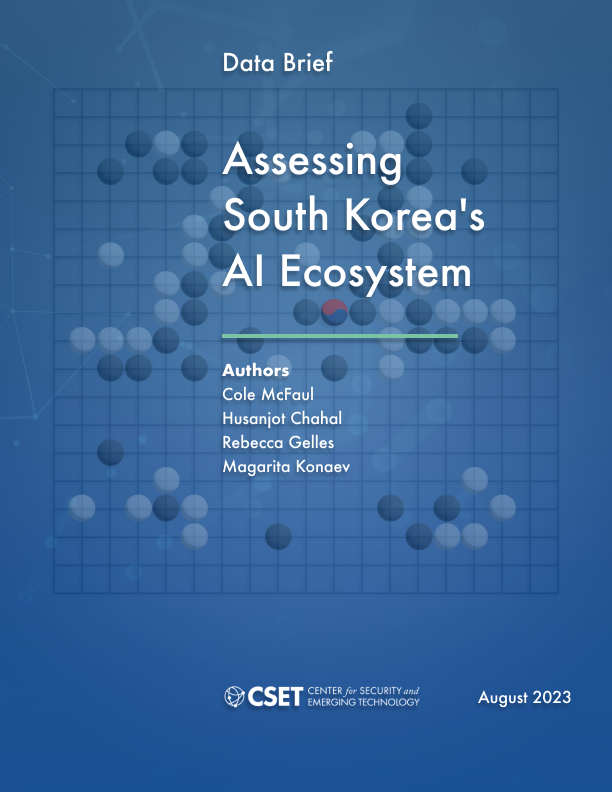To read this report translated into Korean, please click here. 보고서 읽기(한국어 번역)
Executive Summary
South Korea plays an important role in the development of critical and emerging technologies and is fast becoming a major player in artificial intelligence. That said, rising regional tensions and demographic trends may hinder South Korea’s ability to maintain and expand its competitive advantages in AI. This data brief examines South Korea’s progress in AI across five important indicators of development: hardware, patents, investment, research, and talent. Our main findings regarding South Korea’s AI ecosystem are as follows:
Hardware
- South Korea is among the handful of countries globally that produce the highend semiconductor devices needed for AI development. It accounts for a large proportion of the global market share for certain categories of chips that are in high demand, specifically logic and memory chips.
- Semiconductors are the most important export item for the South Korean economy, representing nearly 19 percent of its exports in 2022—the highest of any industry in the country. Almost 60 percent of South Korea’s overall chip exports went to China in 2022, worth $66 billion.
AI Patents
- South Korea ranks third globally in the number of AI patents (applications and granted patents) filed between 2010 and 2021. Samsung and LG account for 9 percent of all AI patents granted in South Korea during that time period.
- Similar to global trends, machine learning is the most patented AI-related technique in South Korea; it featured in 77 percent of all Korean AI patents over the past decade. The country also stands out in AI patents related to fields such as energy management, education, and military, all for which South Korea ranks second globally.
AI Investment
- South Korea’s AI market is still nascent but rapidly growing. Investments into South Korean AI companies have increased consistently almost every year since 2014. In 2021, $2.76 billion was invested in privately held Korean AI companies.
- South Korean funders are the primary investors in South Korea’s AI market, having taken part in nearly 84 percent of the investment transactions targeting Korean AI companies between 2010 and 2021. But foreign investors, particularly from the United States, have been involved in some of the highest value investments in South Korea’s AI start-ups and companies over the past decade.
AI Research
- Between 2010 and 2021, South Korean authors published 68,404 AI-related research papers, ranking 11th globally and trailing behind countries with similar levels of development such as Japan and Italy but ahead of other technologically advanced nations such as the Netherlands.
- The United States is South Korea’s most important AI research partner, followed by China. Thirty-one percent of AI-relevant papers authored by Korean researchers over the past decade were written with an international coauthor.
Talent
- Relative to population, South Korea produces more engineering graduates than the United States, China, and India. Although the number of graduates in AIrelated fields has increased over the past decade, demand for such talent could soon outpace supply.
- Severe gender disparities in AI-related education could undermine South Korea’s ability to cultivate and grow its future AI workforce. In 2021, for example, just 12 percent of doctoral graduates in AI-related fields were women.
